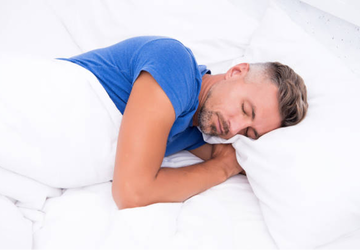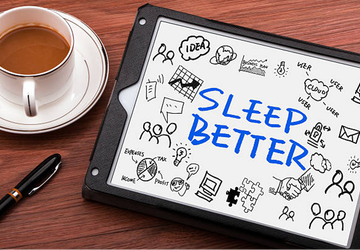beauty
Essentials of Sleep Hygiene
At the core of healthy living is sleep hygiene, a vital yet often neglected aspect of our daily lives. This guide will navigate through innovative approaches and tips for better sleep, enhancing your understanding of how to improve sleep.
Innovating Your Sleep Space
The journey to better rest begins in the bedroom. Here's how to transform it into a sleep haven:
- Ambiance: Embrace calming colors and a clutter-free environment for tranquility.
- Sound Management: Consider soothing soundscapes or the subtle hum of a fan for consistent auditory backgrounds.
- Aromatic Assistance: Gentle, sleep-inducing scents like lavender can promote relaxation.
- Personalized Comfort: Tailor your bed with ergonomic sleeping aids suited to your preferences.
Pioneering a Sleep-Inducing Evening Ritual

Developing a personalized evening routine is a game-changer. Consider these unique steps:
● Digital Detox: Engage in a digital detox at least an hour before bed.
● Mindfulness Practices: Try progressive muscle relaxation or guided imagery for mental peace.
● Creative Journaling: Reflect on your day or jot down tomorrow's tasks to clear your mind.
Nutritional Influence on Sleep
Diet plays a significant role in how to improve sleep. Here are some innovative tips for better sleep related to nutrition:
● Herbal Teas: Sip on chamomile or valerian root tea for their natural sedative effects.
● Balanced Eating: Focus on a balanced diet rich in magnesium and tryptophan, known for supporting sleep.
● Hydration: Stay well-hydrated throughout the day, but reduce fluid intake before bedtime.
Navigating Through Sleep Challenges
Addressing factors that hinder sleep is crucial. Here are some lesser-known disruptors:
● Room Layout: Consider the Feng Shui or Vastu of your bedroom, as it can impact sleep quality.
● Pet Disturbances: If pets disrupt your sleep, create a comfortable sleeping space for them outside your room.
● Daylight Exposure: Regulate your natural sleep-wake cycle by getting ample sunlight during the day.
Exploring Professional Sleep Guidance
Persisting sleep challenges might require professional intervention. Exploring options like cognitive-behavioral therapy for insomnia (CBT-I) or sleep studies can be beneficial.
Integrating Novel Approaches to Sleep Hygiene
Advancing sleep hygiene involves exploring new frontiers. Let’s dive into additional unique methods to enhance your tips for better sleep:
Sensory Optimization for Sleep
Utilizing our senses can play a pivotal role in how to improve sleep:
● Sound Landscapes: Experiment with different nature sounds, like ocean waves or forest ambience, which can promote relaxation.
● Visual Calmness: Incorporate soothing art or visuals in your bedroom that evoke tranquility.
● Tactile Comfort: Invest in bedding that suits your tactile preferences, like weighted blankets for added comfort.
Leveraging Seasonal Sleep Practices
Seasons can affect our sleep patterns. Here’s how to adapt:
● Summer Sleep: Use lighter bedding and consider a fan or air conditioning to maintain a cool environment.
● Winter Rest: Embrace warmer bedding and consider a humidifier to combat dry air.
Advanced Relaxation Techniques

Incorporating advanced relaxation methods can revolutionize your bedtime routine:
● Guided Imagery: Use detailed mental visuals to transport your mind to a state of relaxation.
● Autogenic Training: This self-relaxation technique uses a series of statements to relax the body.
Sleep Hygiene Through Aromatherapy
Aromatherapy can be a powerful tool in enhancing sleep:
● Custom Blends: Experiment with creating your own blend of essential oils that helps you relax.
● Scented Candles: Opt for natural, non-toxic candles with calming scents for pre-sleep relaxation.
Exploring Uncharted Territories in Sleep Hygiene
To further enhance sleep hygiene and provide more tips for better sleep, let's delve into some lesser-known, yet innovative strategies that play a crucial role in how to improve sleep.
Sleep Hygiene and Environmental Design
The design of your sleeping environment can have a significant impact:
● Biophilic Design: Incorporating elements of nature into your bedroom, like natural wood or stone, can create a more restful environment.
● Color Psychology: Utilize calming colors such as soft blues or greens in your bedroom decor to promote tranquility.
The Intersection of Culture and Sleep
Exploring cultural sleep practices can offer unique insights:
● Scandinavian Sleep Practices: The concept of 'hygge', focusing on coziness and comfort, can be applied to create a more inviting sleep environment.
● Mediterranean Siesta Culture: Learning from Mediterranean siesta practices can offer a new perspective on daytime rest and its relationship with nighttime sleep.
Sleep and Sensory Integration
Tuning into your senses can vastly improve sleep quality:
● Olfactory Stimulation: Experiment with different scents, like ylang-ylang or bergamot, which may have sleep-inducing properties.
● Tactile Variations: Try different textures in your bedding, such as bamboo sheets or velvet throws, to find what feels most comfortable.
Advanced Sleep Technologies
Emerging technologies offer new ways to enhance sleep:
● Smart Bed Technology: Beds that adjust firmness based on your sleep position or heat up/cool down according to body temperature.
● Sleep Optimization Software: Programs that analyze your sleep data and provide tailored advice to improve sleep quality.
Nutrition and Sleep Symbiosis
Diet is intricately linked to sleep quality:
● Superfoods for Sleep: Incorporate foods like kiwi or tart cherry juice, which are known to have sleep-promoting properties.
● Anti-Inflammatory Diet: A diet low in inflammation-causing foods can improve sleep quality, particularly for those with chronic pain.
Creative Mindfulness and Sleep
Engaging in creative mindfulness activities can prepare the mind for sleep:
● Mindful Coloring: Engage in mindful coloring activities in the evening to calm the mind.
● Creative Visualization: Practice visualizing serene landscapes or peaceful scenarios as part of your bedtime routine.
Personal Sleep Experiments
Finally, consider conducting personal sleep experiments:
● Sleep Position Experimentation: Experiment with different sleep positions to see which leads to the best night's sleep.
● Bedtime Ritual Testing: Try out various bedtime rituals over a few weeks and note which ones yield the best sleep quality.
From leveraging environmental design and exploring cultural practices to integrating advanced technologies and mindful nutrition, these insights aim to deepen your understanding of how to improve sleep.
Conclusion
This guide, Sleep Hygiene: Tips for Better Sleep, offers a fresh perspective on how to improve sleep. By adopting these innovative tips for better sleep and prioritizing your sleep hygiene, you'll pave the way to restful nights and energetic days.

